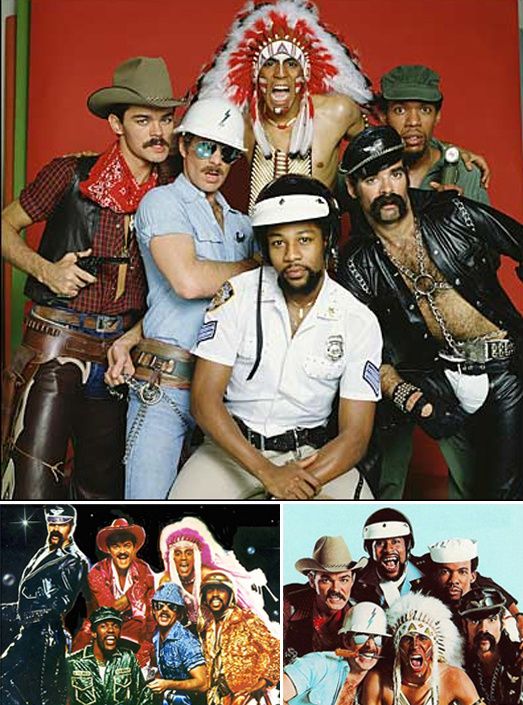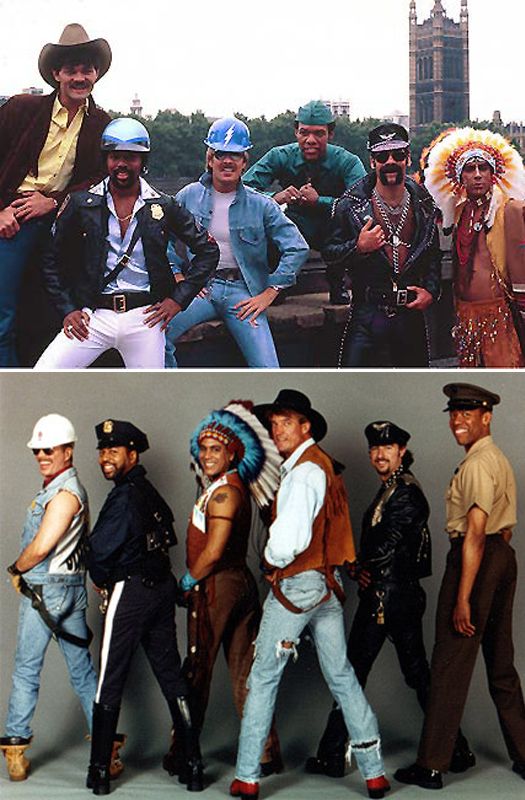
The tales and rumors about the 6-man group known as Village People are many, to be sure. As legend has it, French music producer Jacques Morali was in a gay club in Greenwich Village and became fascinated by dancer Felipe Rose, a go-go boy wearing a Native American costume. This was 1977, the height of Disco, the year Saturday Night Fever was released. Jacques brought an idea to business associate Henri Belolo, with the idea to make a group. One of the first on board was lead singer, Victor Willis, who adopted the police officer costume. Willis was a straight singer/songwriter who had previously worked with Morali. He was married to Phylicia Ayers-Allen, who played Clair Huxtable on The Cosby Show. There was also Felipe, who was the Native American, Randy Jones who played the cowboy, Glenn Hughes who was so convincing as the biker, David Hodo with his construction worker costume, and Alex Briley, the G.I. The idea of the group was to capitalize on the Disco movement that had it's roots in the gay clubs, and put together a group of men wearing archetypal masculine images, often the objects of fantasies of the gay men. Actually, recording began before the costing was complete, and in the early appearances of Village People, the construction worker, cowboy and biker were played by others. But soon the group was together, and making music together.

Top: The originals. Bottom: The replacement cast.
The music was filled with innuendo and double-entendre, sure to make many smile, and to allow those who prefer to be in the dark, stay there. Well, after a couple of club hits, which was the intent of the group, they released the single Macho Man in 1978. This is really the first time I remember hearing of the group, which was actually getting mainstream play with the song. In fact, Macho Man made it to #25 on the Billboard Hot 100 chart.
While many believed the success of Macho Man was just a blip, the group released YMCA next, and it astoundingly made it to #2 on the US Billboard Hot 100. Slick and coy, the song is all but an advertisement for gay sex in the showers of the YMCA. And, it should be noted that over 30 years later, when the opening bars of the song is played at a wedding reception or a sporting event, people of all ages get up to dance and spell it out.
On the heels of those hits, they released the album Go West in 1979. The first single followed the route of the others, finding it's way up the Billboard chart. It wasn't long before In The Navy was #2 on the chart, and a new video featuring the boys, the US Navy and a battleship were in the mix.
As the furor about Disco music came to a head in 1979/1980, with the screams of "Disco Sucks" and the crushing of Disco albums by angry white men at a sporting event, producers readied a movie about the group called Can't Stop The Music. Before that started, Victor Willis left the group, and was replaced by Ray Simpson, brother of successful songwriter/Pop singer Valerie Simpson. There is the ironic factor that the guy how originally played the police officer later has quite the record with the authorities. The soundtrack featured the song Can't Stop The Music, which made it to #10 on the Billboard Hot 100, despite the film's ultimate failure.
The failure of the film was a clear signal of the end of an era. The term 'Disco' was put away, and Dance music was the new term. At the end of 1980, Randy Jones left the group, pursuing his own projects. Than includes a 2007 solo project of dance music that found it's way into my collection. He also married his partner in 2004, which while illegal then, can now be made legal. In 1996, Biker Glenn Hughes retired from performing, and passed away in 2001. Although rumors were rife about his passing, it was after a battle with lung cancer. Rose, Hodo and Briley remain with the group today, often performing at fundraisers and nostalgia events. The music is still popular, and played all the time. And it could be argued that the music is some of the first 'gay' music by gay men to be accepted by the mainstream. To learn more about Village People, check out their official website here.

No comments:
Post a Comment